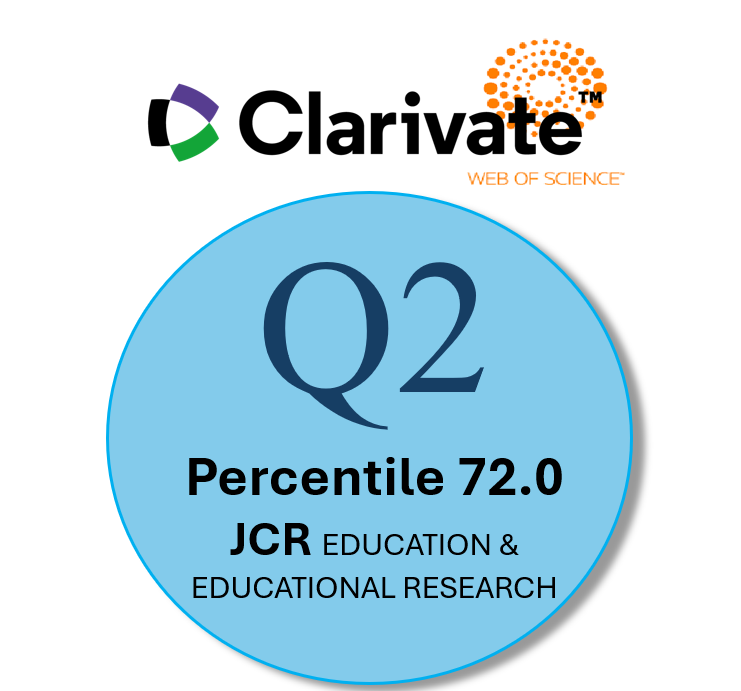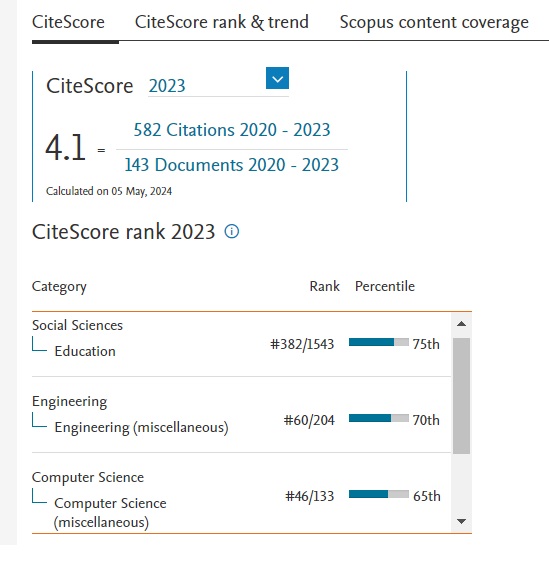El pensamiento computacional en Educación. Análisis bibliométrico y temático.
Resumen
El pensamiento computacional se está considerando actualmente como una de las competencias más demandadas y, de ahí, su planteamiento en el contexto educativo. Este trabajo trata de analizar la literatura científica sobre la aplicación del pensamiento computacional en el ámbito educativo publicada en las colecciones principales de la base de datos Web of Science. Se han tenido en cuenta las variables de año de publicación, los países con más producciones, los autores más productivos en este campo y fuentes documentales con mayor número de publicaciones. Asimismo, se ha realizado una clasificación según los tipos de documentos y los métodos de investigación utilizados, así como las etapas educativas objeto de estudio y los lenguajes de programación utilizados. Se ha hallado una tendencia creciente de publicaciones en esta temática, donde España es uno de los países donde más se publica. Además, se ha observado cómo este campo de estudio se ha abordado desde los dos principales métodos de investigación –cuantitativo y cualitativo— y la etapa educativa más investigada es la educación primaria. Por último, se lleva a cabo una discusión de los resultados y conclusiones, sirviendo este documento como punto de partida para futuras investigaciones sobre el pensamiento computacional en educación.
Descargas
-
Resumen8635
-
PDF7606
Citas
Adell, J. S., Llopis, M.A.N., Esteve, M.F.M., y Valdeolivas, N.M.G. (2019). El debate sobre el pensamiento computacional en educación. RIED. Revista Iberoamericana de Educación a Distancia, 22(1), 171-186. doi: http://dx.doi.org/10.5944/ried.22.1.22303
Álvarez Rodríguez, M. (2017). Desarrollo del pensamiento computacional en educación primaria: Una experiencia educativa con scratch. UTE. Revista de Ciències de l’Educació,1 (2), 45-64. Recuperado de: https://dialnet.unirioja.es/servlet/articulo?codigo=6229578
Balladares B, J. J., Avilés S. M. R., y Pérez N. O. (2016). Del pensamiento complejo al pensamiento computacional: retos para la educación contemporánea. Sophia, colección de Filosofía de la Educación, 21(1), 143-159.
Basogain Olabe, X., Olabe Basogain, M. A., y Olabe Basogain, J. C. (2015). Pensamiento Computacional a través de la Programación: Paradigma de Aprendizaje. Revista De Educación a Distancia, (46). Recuperado de: https://revistas.um.es/red/article/view/240011
Blikstein, P. (2013). Seymour Papert’s legacy: Thinking about learning, and learning about thinking. Seymour Papert Tribute at IDC 2013.
Bocconi, S., Chioccariello, A., Dettori, G., Ferrari, A., Engelhardt, K., Kampylis, P., & Punie, Y. (2016). Exploring the field of computational thinking as a 21st century skill. Proceedings of the EDULEARN16, 16, 4725-4733.
Bocconi, S., Chioccariello, A., Dettori, G., Ferrari, A., & Engelhardt, K. (2016). Developing computational thinking in compulsory education-Implications for policy and practice (No. JRC104188). Joint Research Centre (Seville site).
Brennan, K., & Resnick, M. (2012, April). New frameworks for studying and assessing the development of computational thinking. In Proceedings of the 2012 annual meeting of the American Educational Research Association, Vancouver, Canada (Vol. 1, p. 25). Recuperado de: http://scratched.gse.harvard.edu/ct/files/AERA2012.pdf
Brereton, P., Kitchenham, B.A., Budgen, D., Turner, M., & Khalil, M. (2007). Lessons from applying the systematic literature review process within the software engineering domain. Journal of Systems and Software, 80(4), 571-583. doi: https://doi.org/10.1016/j.jss.2006.07.009
Cearreta-Urbieta, I. (2015). Scratch como recurso didáctico para el desarrollo del Pensamiento Computacional de los alumnos de Secundaria y Bachillerato en la asignatura de Informática y como recurso transversal en el resto de asignaturas.
Recuperado de: https://reunir.unir.net/handle/123456789/3150
Centre for Reviews and Dissemination (Ed.) (2009). Systematic Reviews. CRD’s guidance for undertaking reviews in health care. York, UK: CRD, University of York. Recuperado de https://goo.gl/731Ehh.
Crane, D. (1969). Social structures in a group of scientist: A test of the ‘‘invisible college’’ hypothesis. American Sociological Review, 34(335), 352.
CSTA y ISTE [International Society for Technology in Education (ISTE) and the Computer Science Teachers Association (CSTA)]. (2011). Operational definition of computational thinking. Recuperado de http://www.iste.org/docs/ct-documents/computational-thinking-operational-definition-flyer.pdf
Cabrera Delgado, J. M. (2017). Las Ciencias de la Computación en el currículo educativo. Avances en Supervisión Educativa, (27).
doi: https://doi.org/10.23824/ase.v0i27.584
Del-Moral Pérez, M., Guzmán Duque, A., & Fernández García, L. (2018). Game-Based Learning: Increasing the Logical-Mathematical, Naturalistic, and Linguistic Learning Levels of Primary School Students. Journal of New Approaches in Educational Research, 7(1), 31-39. doi: http://dx.doi.org/10.7821/naer.2018.1.248
Denning, P. J. (2017). Remaining trouble spots with computational thinking. Communications of the ACM, 60(6), 33-39.
García-Fernández, J. M., Inglés, C. J., Gonzálvez, C., Vicent, M., y Gómez Núñez, M. I. (2013). Familia y discapacidad intelectual: Un estudio bibliométrico de 2000-2011 a través del social science citation index. Siglo Cero 44 (246), 67-82. Recuperado de: http://hdl.handle.net/10045/43181
García-Fernández, J. M., Inglés, C. J., Vicent, M., Gonzálvez, C., Gómez-Núnez, M. I., y Poveda-Serra, P. (2016). Perfeccionismo durante la infancia y la adolescencia. análisis bibliométrico y temático (2004-2014). Revista Iberoamericana De Psicología Y Salud, 7(2), 79-88. doi: https://doi.org/10.1016/j.rips.2016.02.001
García-López, L., Gutiérrez, D., Pastor, J., & Romo, V. (2018). Validity and Reliability of a Questionnaire on Primary and Secondary School Teachers’ Perception of Teaching a Competence-based Curriculum Model. Journal of New Approaches in Educational Research, 7(1), 46-51. doi: http://dx.doi.org/10.7821/naer.2018.1.255
García-Peñalvo, F. J. (2016). What computational thinking is. Journal of Information Technology Research, 9(3), v-viii.
García-Peñalvo, F. J., & Mendes, J. A. (2018). Exploring the computational thinking effects in pre- university education. Computers in Human Behavior, 80, 407-411
Glänzel, W. y Schubert, A. (2005). Analysing scientific networks through co-authorship. En H. F. Moed, W. Glänzel, y U. Sch- moch (Eds.), Handbook of Quantitative Science and Technology Research (pp. 373-388).
González Martinez, J., Estebanell Minguell, M., & Peracaula Bosch, M. (2018). Robotics or Coding? The Concept of Computational Thinking in Pre-service Teachers. Education in the Knowledge Society, 19(2), 29-45.
Grover, S., & Pea, R. (2013). Computational thinking in K-12: A review of the state of the field. Educational Researcher, 42(1), 38-43. Recuperado de: https://journals.sagepub.com/doi/pdf/10.3102/0013189X12463051
Gutiérrez Porlán, I., & Serrano Sánchez, J. (2016). Evaluation and development of digital competence in future primary school teachers at the University of Murcia. Journal of New Approaches in Educational Research, 5(1), 51-56. doi: http://dx.doi.org/10.7821/naer.2016.1.152
Higgins, J.P., & Green, S. (Eds.) (2006). Cochrane handbook for systematic reviews of interventions 4.2.6. The Cochrane collaboration. Recuperado de https://goo.gl/6uU6tM
Ioannou, A., & Makridou, E. (2018). Exploring the potentials of educational robotics in the development of computational thinking: A summary of current research and practical proposal for future work. Education and Information Technologies, 23(6), 2531-2544.
Kitchenham, B. A. (2004). Procedures for performing systematic reviews. Keele University: Technical Report TR/SE-0401 and NICTA Technical Report 0400011T.1. Recuperado de https://goo.gl/wQcMaS
Kong, S. C., Chiu, M. M., & Lai, M. (2018). A study of primary school students' interest, collaboration attitude, and programming empowerment in computational thinking education. Computers & Education, 127, 178-189.
doi: https://doi.org/10.1016/j.compedu.2018.08.026
Montero, I., & León, O. G. (2007). A guide for naming research studies in Psychology. International Journal of clinical and Health psychology, 7(3).
Naughton, J. (2012). 'A manifest for teaching computer science in the 21st century'. The Observer, 31 de marzo.
OCDE. (2018). Job Creation and Local Económic Development 2018. Recuperado de: http://www.oecd.org/cfe/job-creation-and-local-economic-development-26174979.htm
Olabe, J. C., Basogain, X., Olabe, M. A., Maíz, I. & Castaño, C. (2014). Solving math and science problems in the real world with a computational mind. Journal of New Approaches in Educational Research, 3(2), 75-82. doi: http://dx.doi.org/10.7821/naer.3.2.75-82
Papert, S. (1980). Mindstorms: Children, computers, and powerful ideas. Basic Books, Inc.
Pérez, N. H. O., y Roig-Vila, R. (2015). Entornos de programación no mediados simbólicamente para el desarrollo del pensamiento computacional. Una experiencia en la formación de profesores de Informática de la Universidad Central del Ecuador. Revista de Educación a Distancia, (46), 1-22. Recuperado de: https://dialnet.unirioja.es/servlet/articulo?codigo=6022698
Pinto-Llorente, A. M., Casillas-Martín, S., Cabezas-González, M., & García-Peñalvo, F. J. (2018). Building, coding and programming 3D models via a visual programming environment. Quality & Quantity, 52(6), 2455-2468. doi: https://doi.org/10.1007/s11135-017-0509-4
Repenning, A., Basawapatna, A. R., & Escherle, N. A. (2017). Principles of Computational Thinking Tools. In P. Rich, & C. Hodges (Eds.), Proceedings of Emerging Research, Practice, and Policy on Computational Thinking (pp. 291-305). Recuperado de: https://link.springer.com/chapter/10.1007/978-3-319-52691-1_18
Román-González, M. (2015). Test de Pensamiento Computacional: principios de diseño, validación de contenido y análisis de ítems. Perspectivas y avances de la investigación, 279-302.
Sancho Gil, J., & Padilla Petry, P. (2016). Promoting digital competence in secondary education: are schools there? Insights from a case study. Journal of New Approaches in Educational Research, 5(1), 57-63. doi: http://dx.doi.org/10.7821/naer.2016.1.157
Valverde Berrocoso, J., Fernández Sánchez, M. R., y Garrido Arroyo, M. C. (2015). El pensamiento computacional y las nuevas ecologías del aprendizaje. Revista de Educación a Distancia, (46). Recuperado de: https://revistas.um.es/red/article/view/240311
Vázquez-Cano, E. y Ferrer Delgado, D. (2015). La creación de videojuegos con Scratch en Educación Secundaria. Communication papers: media literacy and gender studies, 4(6), 63-73.
Recuperado de: https://dialnet.unirioja.es/servlet/articulo?codigo=5182831
Wartenweiler, T. (2018). Serious Play in Education for Social Justice - A Mixed-Methods Evaluation. Journal of New Approaches in Educational Research, 7(1), 61-69. doi: http://dx.doi.org/10.7821/naer.2018.1.260
Wing, J. M. (2006). Computational thinking. Communications of the ACM, 49(3), 33-35.
Wing, J. M. (2009, November). Formal methods for privacy. In International Symposium on Formal Methods (pp. 1-15). Springer, Berlin, Heidelberg.
Yadav, A., Hong, H., & Stephenson, C. (2016). Computational thinking for all: Pedagogical approaches to embedding 21st century problem solving in K-12 classrooms. Techtrends, 60(6), 565-568. https://doi.org/10.1007/s11528-016-0087-7
Yadav, A., Mayfield, C., Zhou, N., Hambrusch, S., & Korb, J. T. (2014). Computational thinking in elementary and secondary teacher education. Acm Transactions on Computing Education, 14(1), 5. doi: 10.1145/2576872
Yagci, M. (2019). A valid and reliable tool for examining computational thinking skills. Education and Information Technologies, 24(1), 929-951. doi: https://doi.org/10.1007/s10639-018-9801-8
Zapata-Ros, M. (2015). Pensamiento computacional: Una nueva alfabetización digital. RED. Revista de Educación a Distancia, (46). Recuperado de: https://www.um.es/ead/red/46/
Las obras que se publican en esta revista están sujetas a los siguientes términos:
1. El Servicio de Publicaciones de la Universidad de Murcia (la editorial) conserva los derechos patrimoniales (copyright) de las obras publicadas, y favorece y permite la reutilización de las mismas bajo la licencia de uso indicada en el punto 2.
2. Las obras se publican en la edición electrónica de la revista bajo una licencia Creative Commons Reconocimiento-NoComercial-SinObraDerivada 3.0 España (texto legal). Se pueden copiar, usar, difundir, transmitir y exponer públicamente, siempre que: i) se cite la autoría y la fuente original de su publicación (revista, editorial y URL de la obra); ii) no se usen para fines comerciales; iii) se mencione la existencia y especificaciones de esta licencia de uso.
3. Condiciones de auto-archivo. Se permite y se anima a los autores a difundir electrónicamente las versiones pre-print (versión antes de ser evaluada) y/o post-print (versión evaluada y aceptada para su publicación) de sus obras antes de su publicación, ya que favorece su circulación y difusión más temprana y con ello un posible aumento en su citación y alcance entre la comunidad académica. Color RoMEO: verde.














